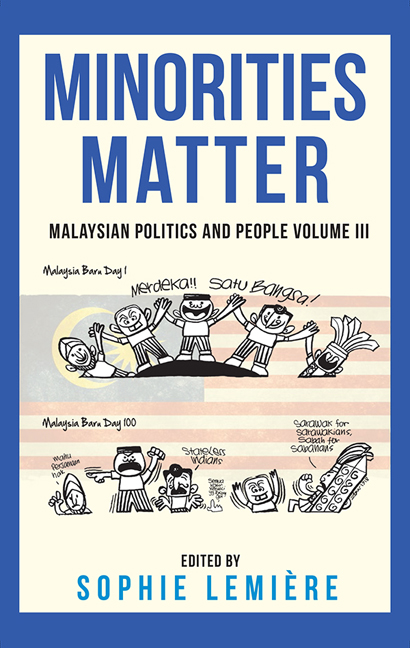Book contents
- Frontmatter
- Contents
- Acknowledgements
- Foreword
- Introduction
- Part I Engaging Politics: The Role of Minorities in GE14 and Beyond
- Part II Building Democracy: Malaysia Baru and the (Im-)possible Reform
- 6 Malaysia – A State of Sanctuary?
- 7 The Image of Laziness and the Malaysian Middle Class: Unpacking the Politics of Indolence
- 8 Poverty, Inequality and Youth Mental Health: Psychological Distress is Political
- 9 Competing Rights Talk and Pakatan Harapan's Incoherent Human Rights Agenda
- 10 The Court of the King of Hearts: The Long Failure of the Malaysian Judiciary – A Legal and Personal Perspective
- List of Contributors
6 - Malaysia – A State of Sanctuary?
from Part II - Building Democracy: Malaysia Baru and the (Im-)possible Reform
Published online by Cambridge University Press: 25 January 2020
- Frontmatter
- Contents
- Acknowledgements
- Foreword
- Introduction
- Part I Engaging Politics: The Role of Minorities in GE14 and Beyond
- Part II Building Democracy: Malaysia Baru and the (Im-)possible Reform
- 6 Malaysia – A State of Sanctuary?
- 7 The Image of Laziness and the Malaysian Middle Class: Unpacking the Politics of Indolence
- 8 Poverty, Inequality and Youth Mental Health: Psychological Distress is Political
- 9 Competing Rights Talk and Pakatan Harapan's Incoherent Human Rights Agenda
- 10 The Court of the King of Hearts: The Long Failure of the Malaysian Judiciary – A Legal and Personal Perspective
- List of Contributors
Summary
Malaysia is a place of sanctuary for many persecuted individuals and communities from around the world. In the 2018 general election Pakatan Harapan included in its manifesto of 60 promises, a commitment to improve the lives of refugees and asylum-seekers; promise number 59 was to ratify the 1951 Refugee Convention and its 1967 Protocol. However, hot on the heels of the election it was announced by UNHCR in June 2018 that resident Chins would have to go back home to Myanmar by 2020. At present this community and others like it live in Malaysia without local legal protections including access to employment and formal education, and are indistinguishable from other irregular migrant groups. The policies that govern this community remain ad hoc and assume Malaysia as a temporary home for unrecognised refugees and asylum-seekers. There are some 160,000 refugees and asylum-seekers registered with the United Nations High Commission for Refugees (UNHCR) in Kuala Lumpur. Around 140,000 of these are from Myanmar, comprising an estimated 75,000 Rohingya, 30,000 Chins, 10,000 Myanmar Muslims, 4,000 Rakhines and Arakanese and other ethnicities. There are also 22,000 refugees and asylumseekers from other countries including Pakistan, Yemen, Somalia, Syria, Sri Lanka, Afghanistan, Iraq and Palestine. The time is therefore ripe to reassess the situation facing refugees and asylum-seekers amidst the changed political landscape in Malaysia. This chapter draws on ethnographic research with refugee communities in Malaysia to inform broader legal, policy and political discussions on charting the future of this community and its place in Malaysia.
Introduction
Malaysia, which has the second largest refugee population in Southeast Asia, is currently a non-signatory to the Refugee Convention. As of January 2018, there were 153,480 refugees and asylum-seekers registered with UNHCR. Approximately 133,000 persons originate from Myanmar, of whom 42 per cent have been identified as ethnic Rohingya. The UNHCR also estimates there are an additional 35,000 unregistered asylum-seekers in Malaysia who are mostly Rohingya. In addition to those from Myanmar, UNHCR receives asylum-seekers and refugees originating from 50-plus countries including Syria, Palestine, Yemen, and Somalia (UNHCR, 2018). The UNHCR's arrangements with the Malaysian government took place under the regional constraints of non-intervention in the domestic affairs of an ASEAN member state and a consensus-building decision-making approach to regional affairs. As such, since 1979 the UNHCR has had a working but informal relationship with the Malaysian government and international and national NGOs operating in Malaysia.
- Type
- Chapter
- Information
- Minorities MatterMalaysian Politics and People Volume III, pp. 92 - 107Publisher: ISEAS–Yusof Ishak InstitutePrint publication year: 2019

